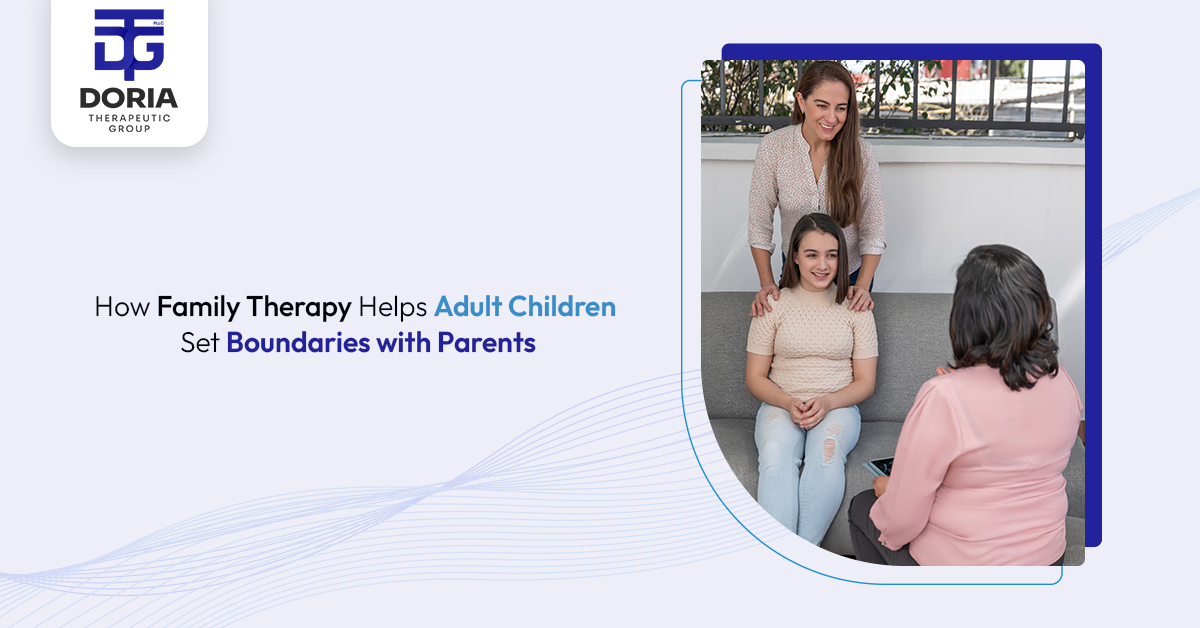Adult children can discover that they can love their parents deeply while still protecting their own emotional space.
The relationship between adult children and their parents exists in a delicate balance of love, respect, and sometimes, necessary distance.
When these dynamics become overwhelming or unhealthy, family therapy can help.
Why Boundaries Matter in Adult Family Relationships
Even decades later, many adults are still stuck in childhood patterns with their parents.
The very dynamics that were in effect when one was twelve, in a way they remain in effect at thirty-five.
This is not unusual; indeed, this is a common thing.
- Emotional overreach: Parents who still treat adult children as extensions of themselves
- Financial entanglement: Money used as a tool for control or manipulation
- Guilt-driven communication: Communication where you end up feeling exhausted or guilty about the feelings of your parent
- Invasion of privacy: Parents who assume they have a right to all the information about your life
These patterns do not just vanish just because you have grown. They need deliberate and intentional effort to shift.
Finding Your Voice in a Safe Space
A skilled family therapist acts as a neutral guide, helping both generations navigate the complex issues.
It is not the process of taking sides but rather forming understanding.
In therapy, conversations happen differently. There’s structure. There’s an intention. Most importantly, there’s safety for everyone to express themselves.
- Facilitated communication: A therapist helps family members hear each other without getting defensive
- Pattern recognition: Identifying the cycles that keep everyone stuck
- Skill building: Learning how to express needs without attacking or withdrawing
- Perspective shifting: Understanding how each person’s actions affect the family system
Things That Make a Difference
Setting boundaries isn’t about building walls—it’s about creating healthy gates. Family therapy involves learning certain techniques.
Using The “I” Statement
Instead of “You always interrupt me,” try “I feel unheard when conversations move quickly. Can we slow down?”
Time and Space Boundaries
- Setting specific times for phone calls
- Creating physical spaces that are off-limits
- Establishing topics that are not up for discussion
Forming Boundaries
Learning to say, “I understand you’re upset, but I can’t fix this for you” without even feeling guilty about it.
Learning to Disappoint Your Parents Without Guilt
Many adult children have never learned that their parents’ feelings aren’t their responsibility to manage.
This doesn’t mean becoming cold or uncaring.
- Small steps first: Once you have practiced saying no to little things, address bigger problems
- Be congruent: Boundaries can only work when they are applied consistently
- Anticipate resistance: No one is comfortable with change when it first happens
- Have patience: New patterns also require time to put into place
Navigating Pushback with Grace
Not every parent is keen on such changes when they appear. When an adult child starts imposing boundaries, some might even feel hurt, confused or angry.
Family therapy comes in particularly handy at this point.
A therapist can assist parents in knowing that boundaries are not a specific rejection mechanism but rather an invitation to a healthier dynamic.
Adult children tend to open up more rather than less when they have a sense of safety and respect.
Beyond the Parent-Child Dynamic
Something profound happens when adult children learn to set boundaries with their parents.
- Other relationships improve, too.
- Marriages become stronger.
- Friendships deepen.
The skills learned in family therapy extend far beyond the parent-child dynamic.
Children of these adults also benefit from growing up with healthier models of respect and communication.
Your Next Step
Create the family relationships you’ve always wanted.
It all begins with a single conversation.
At Doria Therapeutic Group, PLLC, we understand the challenges adult children face when setting boundaries with parents.
Our skilled, clinical team is here to help.
Call (914) 246-4100 or make an online appointment with us to get started.
For mental health support and resources, visit NAMI.
FAQ
Will family therapy damage my relationship with my parents?
Proper boundaries normally enhance the relationship by eliminating negativity and establishing respect.
What happens when my parents do not want to go to therapy?
Individual therapy is still an option that may assist you in developing skills of boundary setting and working through family dynamics.
How long does a family therapy session last?
Each family is unique, but most experience the outputs in a few months of sustained effort.




